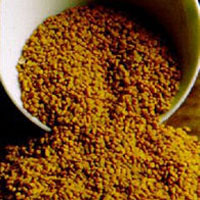Gluten Free
What does following a gluten-free diet mean? That you're embarking on an easy diet with a wide range of health-promoting effects. Instead of dwelling on what you’re giving up, consider that you’re going to enjoy a whole new world of delicious food options to meet your special dietary needs. You’ll be eating seasonally, choosing more fresh fruits and vegetables, focusing on meats, seafood, poultry, legumes, lentils, corn, and rice, and discovering fascinating ancient grains such as quinoa, amaranth, and millet. You’ll be able to eat potatoes, eggs, most cheeses, even chocolate (!)—and enjoy them without guilt because you’ll be taking good care of your body. In fact, you’ll probably end up eating—and feeling—better than ever!
Visit this page for more information about living Gluten Free
---
We carry a large variety of gluten free items, the brands listed below represent just some of the offerings we carry















More Diets
Fenugreek
 © Steven Foster
© Steven FosterHow It Works
Fenugreek seeds contain alkaloids (mainly trigonelline) and protein high in lysine and L-tryptophan. Its steroidal saponins (diosgenin, yamogenin, tigogenin, and neotigogenin) and mucilaginous fiber are thought to account for many of the beneficial effects of fenugreek. The steroidal saponins are thought to inhibit cholesterol absorption and synthesis,2 while the fiber may help lower blood sugar levels.3 One human study found that fenugreek can help lower cholesterol and blood sugar levels in people with moderate atherosclerosis and non-insulin-dependent (type 2) diabetes.4 Preliminary and double-blind trials have found that fenugreek helps improve blood sugar control in patients with insulin-dependent (type 1) and non-insulin-dependent (type 2) diabetes.5, 6, 7 Double-blind trials have shown that fenugreek lowers elevated cholesterol and triglyceride levels in the blood,8, 9 This has also been found in a controlled clinical trial with diabetic patients with elevated cholesterol.10 Generally, fenugreek does not lower HDL (“good”) cholesterol levels.
How to Use It
Due to the somewhat bitter taste of fenugreek seeds, de-bitterized seeds or encapsulated products are preferred. The German Commission E monograph recommends a daily intake of 6 grams.11 The typical range of intake for diabetes or cholesterol-lowering is 5–30 grams with each meal or 15–90 grams all at once with one meal. As a tincture, 3–4 ml of fenugreek can be taken up to three times per day.
Copyright © 2025 TraceGains, Inc. All rights reserved.
Learn more about TraceGains, the company.
The information presented by TraceGains is for informational purposes only. It is based on scientific studies (human, animal, or in vitro), clinical experience, or traditional usage as cited in each article. The results reported may not necessarily occur in all individuals. Self-treatment is not recommended for life-threatening conditions that require medical treatment under a doctor's care. For many of the conditions discussed, treatment with prescription or over the counter medication is also available. Consult your doctor, practitioner, and/or pharmacist for any health problem and before using any supplements or before making any changes in prescribed medications. Information expires December 2025.











